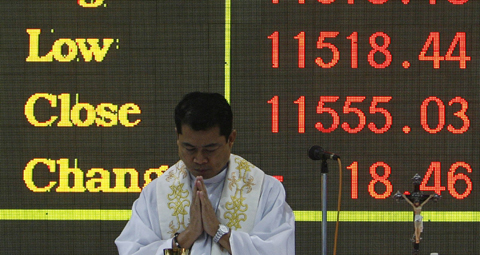October 26 | ![]() 0 COMMENTS
0 COMMENTS ![]() print
print

The best things in life should be free
In his Letter from America, Brandon McGinley finds giving without seeking return, is the only way to spiritual fulfilment
If we were to name one activity that defines life in the western world in the 21st century, it would be the transaction. The quid pro quo is assumed to be the natural and fundamental form of relationship between human beings.
We have memorialised this expectation in any number of cliches and aphorisms: you get what you pay for; there’s no such thing as a free lunch; and so on and so on.
The virtuous pagan philosophers of ancient Greece recognised the transactional relationship for what it is—the least elevating form of acquaintanceship. But today, we hardly imagine any relationship—even the closest family bonds—being primarily non-transactional.
We speak of marriage more like a business contract than a sacred covenant; parents tally up the costs of childrearing as an ‘investment’ they expect their children to capitalise on; then those children act as if their duties to their parents end the moment they achieve financial independence.
Gratuitousness is not only uncommon, but unsettling, embarrassing, and even a little frightening.
Consider how awkward it has become to give and receive gifts outside of the small number of occasions prescribed for such exchanges. Accepting anything unearned feels inappropriate and even illegitimate—or we suspect the gift is not really gratuitous at all, but a ploy to extract a future consideration. In turn, we hesitate to give for fear of causing embarrassment or unintentionally suggesting a quid pro quo.
This is life colonised by the ideology of the marketplace. The transactional society has the virtue of being clear-eyed about the corruption of our human nature: the primordial sin turned us in on ourselves and away from God. But this account of human relationships focuses so strongly on the Fall that it forgets about the Christ. It denies that our sinful self-interest can be healed and even overcome. It denies, that is, the efficacy of grace.
‘Grace’ and ‘gratuitousness,’ you might have guessed, come from the same Latin root. They both refer to giving that is unearned and that expects no recompense. They both challenge the hegemony of the transactional in our culture. When we remember that God can, and does, give us something so extraordinary—participation in His divine life—that we could never earn or repay it, we are reminded that we can, and must, give like He does. In so doing we not only co-operate with His grace, but we communicate it to others.
Cultivating habits of gratuitousness begins in the home. One of the most difficult balancing acts of parenthood is building a family that is both a training ground for and a haven from the surrounding culture.
Part of loving our children, then, is teaching them that good (and bad) consequences are often earned and that they will one day be released into a culture obsessed with transaction. But part—maybe even the greater part—is demonstrating that many good things, like love itself, are not earned, but rather are our duties to give to others.
I think about this especially when we fall into cycles of punishment and defiance with our children. The loving impulse to instill discipline in them can degrade into a thoughtless habit, especially when trying to manage the emotions and development of several children at once.
We begin to think like the world around us thinks: They will only deserve our warmth once they have earned it.
At these times—or at least once I’ve recognised that we’ve fallen into such a cycle, which sometimes takes a while—I make it a point to do something gratuitously nice for the child in question: a trip to the ice cream shop, a new trinket to play with, or even just a big hug. The point is to remind them—and, just as importantly, myself—that there’s nothing they have to do to earn my love, that some things in life really are free.
Hans Urs Von Balthasar wrote in one of his last books, Unless You Become Like This Child, that ‘Love is what enables the child to experience its absolute neediness as something other than a threat.’
We live in a world that too often sees neediness and weakness as alternately an excuse to abuse or a threat to the vitality of the social and economic order. It is a subtle but radical act to live as if our worth isn’t dependent on what we are able to transact, and to give (and receive) that which has not been earned.











